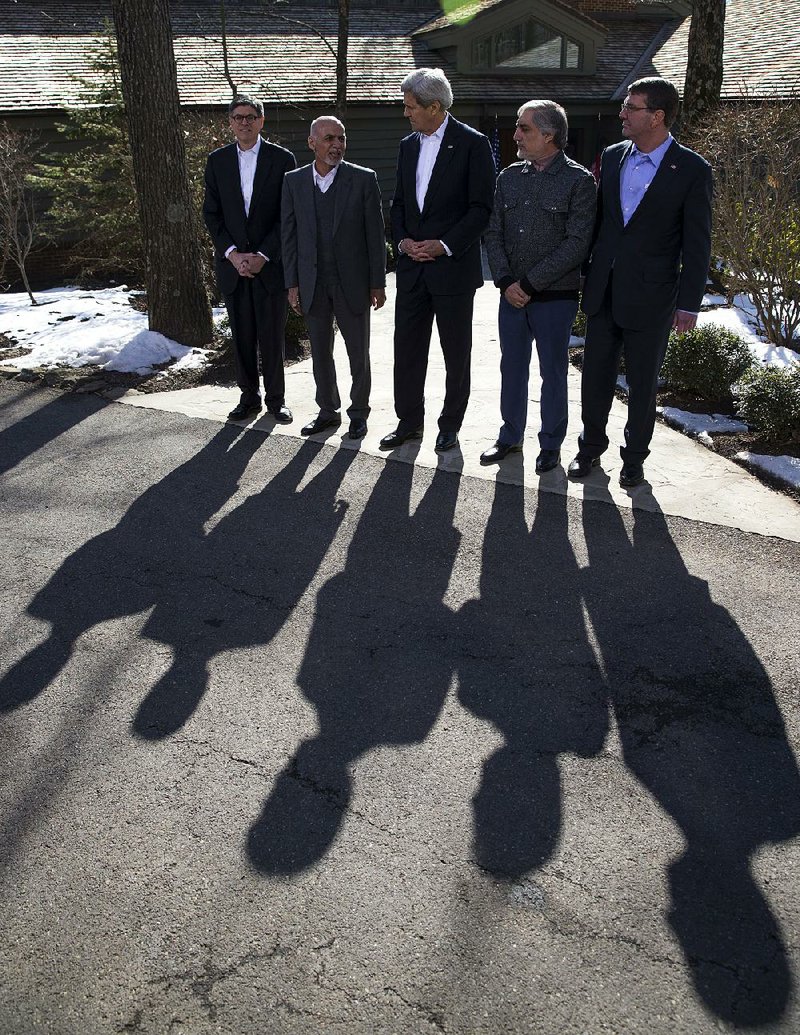CAMP DAVID, Maryland -- U.S. and Afghan leaders laid the groundwork Monday for new relations between the two countries linked for years as war partners, including plans to seek U.S. funding to maintain an Afghan security force of 352,000 and discussions about future U.S. troop levels as the war winds down.
The all-day session, at Camp David in Maryland, included dozens of U.S. and Afghan officials, including Secretary of State John Kerry, Defense Secretary Ashton Carter and Afghan President Ashraf Ghani and chief executive Abdullah Abdullah. The talks were aimed at restarting a U.S.-Afghan relationship strained by nearly 14 years of war and the United States' often-testy relations with the former president, Hamid Karzai.
During the meeting, the U.S. agreed to seek funding through 2017 for an Afghan force of 352,000, a level the nation has yet to meet. U.S. administration officials said the Afghan government is trying to improve recruiting to make up for security forces who leave the service or simply abandon their jobs.
They also agreed to require the Afghan government to complete specific changes and meet other milestones in order to receive up to $800 million. U.S. officials said the Afghans suggested the incentive-based funding idea. The leaders of the two nations also said they would restart routine ministerial-level Defense and State department meetings.
Ghani is expected to meet today with President Barack Obama, a meeting during which officials expect the U.S. to make clear its decision to slow the pace of the withdrawal of U.S. troops from Afghanistan.
Obama has promised to pull all remaining troops out by the end of his presidency. But deficiencies in the Afghan security forces, heavy casualties in the ranks of the Afghan army and police, a fragile new government and fears that Islamic State fighters could gain a foothold in Afghanistan have combined to persuade Obama to slow the withdrawal.
Ghani, who has expressed worries about Islamic State militants, has pressed to keep more U.S. troops there longer, but Obama has promised to end the war in Afghanistan before his presidency ends in January 2017.
During a visit to the Pentagon on Monday, Ghani thanked U.S. troops and taxpayers for their sacrifices in nearly 14 years of war.
"We do not now ask what the United States can do for us," Ghani said in remarks meant to bolster the Obama administration's conviction that he is a reliable partner worth supporting over the long term. "We want to say what Afghanistan will do for itself and for the world," he added. "And that means we are going to put our house in order."
Meanwhile in Afghanistan, hundreds marched in Kabul, demanding justice for a woman beaten to death last week by a mob over false allegations she had burned a Koran -- a killing that shocked many Afghans and renewed calls for authorities to ensure women's rights to equality and protection from violence.
On Thursday, a mob of men beat a 27-year-old religious scholar named Farkhunda to death, threw her body off a roof, ran over it with a car, set it on fire andthen threw it into the Kabul River near one of the Afghan capital's most renowned mosques, the Shah Doshamshera.
Protesters who gathered near the Shah Doshamshera mosque Monday demanded the government prosecute all those responsible for the death.
Social activists planted a pine tree on the riverbank spot where Farkhunda's body was set alight. The demonstrators, many of them members of the Solidarity Party of Afghanistan, blocked the road outside the mosque and marched along the riverside route, starting from where the attack began.
Many women in the crowd wore masks of Farkhunda's battered and bloodied face, which has appeared widely on social media. They carried a banner accusing the government of breaking promises to end corruption and bring rule of law to Afghanistan.
Kabul's police chief, Abdul Rahman Rahimi, said 18 people had been arrested and all had confessed to their role in Farkhunda's death.
"We have enough evidence" against the suspects, he announced at a news conference as the 18 were brought out before the media. He said 13 policemen based in the area of the mosque had been suspended amid allegations they stood by and did nothing to stop the attack and that another four were under investigation.
Information for this article was contributed by Robert Burns, Sagar Meghani, Lynne O'Donnell, Rahim Faiez and Amir Shah of The Associated Press.
A Section on 03/24/2015


